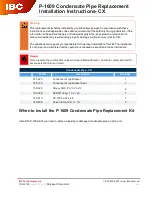
INSTALLATION, OPERATION AND MAINTENANCE MANUAL
Easco Boiler Corp 1175 Leggett Ave Bronx, NY 1047 T: 718.378.3000 F: 718.378.4560 [email protected] easco.com
Page 38 of 46
7.6 Chemicals Used
The following chemicals are commonly used for boiler water treatment.
A) Inorganic
• NaOH
Caustic Soda (sodium hydroxide)
• Na
3
PO
4
Trisodium Phosphate (TSP)
• NaH
2
PO
4
Sodium Acid phosphate
• Na
5
P
3
O
10
Sodium Tripolyphosphate
• NaB
4
O
7
Sodium Borate
• Na
2
SO
3
Sodium Sulphite
• NaNO
3
Sodium Nitrate
• NaNO
2
Sodium Nitrate
B) Organic
•
Sodium Alginate and other seaweed derivatives
•
Quebrancho Tannin
•
Lignin Sulfonate
•
Starch
7.7 Functions of Chemicals
7.7.1 Caustic Soda – Use of caustic soda is one way to insure proper pH and complete
precipitation of the magnesium salts. The optimum pH is 9.5 with a permissible
minimum of 9.0. Recommended level is 9.0 – 9.5.
7.7.2 Chromates and Sulphites – Sodium chromate and sodium sulphite are used to
control corrosion. Sodium sulphite is an oxygen scavenger picking up the oxygen, which
converts the sulphite to sodium sulfate.
NOTE:
Chromate id still recognized as one of the best inhibitors for protection of metal,
although it is now prohibited by most states or cities for use as water treatment due to the
toxic effect of the chromate when dumped in rivers, streams and sanitary sewage systems.
7.7.3 Phosphates – The various sodium phosphates serve to precipitate the hard
water salts as insoluble lime and magnesia phosphates. Polyphosphates are a form of
phosphate that sequesters rather than precipitate.
7.7.4 Nitrates and Nitrites – Nitrates serve to prevent metal embattlement. Nitrites
act similarly to sulphites, but under certain conditions where dissimilar metals are
immersed in the boiler water, particularly copper or brass and soft solder, nitrites can
cause very severe localized corrosion unless suitable inhibiting agents are present. Until
recently, nitrites have not been commonly used where the water is boiled. Their use is
generally confined to hot water systems.
7.7.5 Organic Agents – The organic agents act as protective colloids. When the
inorganic treatment chemicals precipitate the hard water salts, these organic agents
tend to keep the insoluble matter in suspension as sludge and prevent the information
of dense adherent scale on the heat transfer boiler surfaces.









































